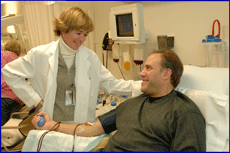Getting Here

For information about travel to the NIH Blood Bank on the NIH campus or the Donor Center at Fishers Lane, see our How to Find Us section.
Registration
When you arrive, you are greeted by a friendly Donor Resources Specialist, who obtains and verifies information such as your address, date of birth, and contact numbers. Presentation of your NIH Blood Donor Card, if you have been here before, facilitates the registration process. A picture ID must be presented by all first-time blood donors, and by all returning donors who do not have their NIH Blood Donor Card.
Donor Interview
You are now ready to proceed to the medical screening area, where you read donor education materials. These materials present important information on behavior that may place individuals at increased risk for exposure to the acquired immune deficiency syndrome (AIDS) virus. Because this virus can be transmitted by blood transfusion, donor education materials asks those "at risk" for exposure to this virus not to donate blood.
In the privacy of the screening area, you are joined by an interviewer, who obtains your medical history and checks your temperature, pulse, and blood pressure. A small blood sample is obtained by pricking your finger to be sure your iron level is adequate. Donors may be deferred from donating blood temporarily for reasons such as low iron levels, or permanently for reasons such as a history of hepatitis. To protect both the donor's privacy and the blood supply, all information obtained during the screening process is considered confidential.
Donor Room
You will relax in the donor chair while the phlebotomist cleans your arm with special antiseptic solutions. As the needle is inserted into your vein, you will feel a brief sting. Once the needle is in place, you will recline comfortably while gently squeezing a soft ball.
The sterile collection kits (needles, tubing, bags) used for blood component donations and platelet donations are completely disposable and are discarded after each donation. Therefore, donating never places the donor at risk for contracting diseases such as hepatitis or AIDS.
Refreshments
Every good deed has its reward! After completing your donation, you'll have an opportunity to relax and enjoy a light snack plus juice and other beverages.
Conclusion
If you are at least 17 years old, in good health, and interested in becoming a blood donor, please contact the NIH Blood Bank at (301) 496-1048, or interested in becoming a platelet donor, please contact the Donor Center at Fishers Lane at (301) 496-4321.

